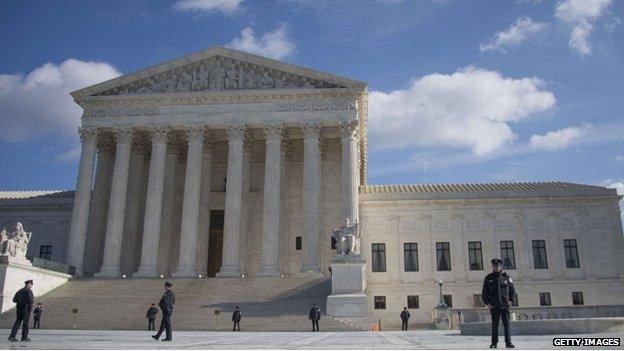US Supreme Court divided on execution drug case
- Published

The Supreme Court halted three executions in Oklahoma ahead of the arguments
US justices appear sharply divided over whether an execution drug can be used, after arguments at the Supreme Court.
Conservative judges on the high court seemed to agree with Oklahoma's use of midazolam, with some questioning why the court was hearing the case at all.
Lawyers for three of the state's death row inmates say the drug presents an unconstitutional risk of pain and suffering.
Their executions have been put on hold amid the court review.
The Supreme Court justices previously ruled Oklahoma could not execute Richard Glossip, John Grant and Benjamin Cole by lethal injection using midazolam while the case is pending.
At issue before the Supreme Court is not the constitutionality of the death penalty, but whether the use of midazolam violates the US constitutional protection against cruel and unusual punishment.
The drug was used in three executions seen as botched in 2014.
Lawyers for the three inmates argue that midazolam cannot achieve the level of unconsciousness required and is therefore unsuitable for executions.
Oklahoma has maintained the drug is effective and that a botched execution in 2014 was the result of other factors.
The court's liberal justices questioned whether the drug was effective enough, with Justice Elena Kagan saying that if it does not work, then inmates would be "burned alive from the inside" from the other drug used in the process, potassium chloride.
Meanwhile, Justice Samuel Alito queried why the court had agreed to take the case, complaining of a "guerrilla war" by opponents of the death penalty to limit the options available for execution.
Justice Anthony Kennedy, often a deciding vote in sharply split cases, said little during the arguments.

Opponents say midazolam is not effective enough to be used in executions
Oklahoma Governor Mary Fallin recently signed a law allowing the state to use nitrogen gas as an alternative execution method.
Arizona, Florida, Ohio have also used the drug in executions.
A decision by the Supreme Court on the case is due by the end of June.
- Published15 November 2013
